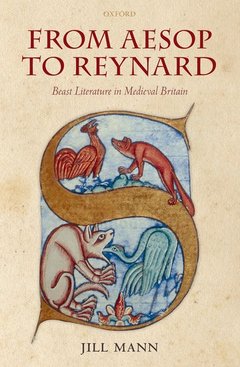Description
From Aesop to Reynard
Beast Literature in Medieval Britain
Author: Mann Jill
Language: English
Publication date: 11-2009
394 p. · 16.3x24.2 cm · Hardback
394 p. · 16.3x24.2 cm · Hardback
Description
/li>Contents
/li>Biography
/li>Comment
/li>
What do stories about animals have to tell us about human beings? This book analyzes the shrewd perceptions about human life - and especially human language - that emerge from narratives in which the main figures are 'talking animals'. Its guiding question is not 'what' but 'how' animals mean. Using this question to draw a clear distinction between beast fable and beast epic, it goes on to examine the complex variations of these forms that are to be found in the literature of medieval Britain, in English, French, Latin, and Scots. The range, variety, and brilliant inventiveness of this tradition are demonstrated in chapters on the fables of Marie de France, the Speculum stultorum of Nigel of Longchamp (the comic adventures of a donkey), the debate poem The Owl and the Nightingale, Chaucer's Parliament of Fowls and the tales of the Squire, Manciple and Nun's Priest, the Reynardian tale of The Fox and the Wolf, and the Moral Fabillis of Robert Henryson. English translations provided for all quotations make the works discussed accessible to the modern reader.
Introduction. 1. How Animals Mean. 2. Marie de France: the Courtly Fable. 3. Nigel of Longchamp: the Speculum stultorum. 4. The Owl and the Nightingale. 5. Chaucerian Birds. 6. Reynard in England. 7. Henryson: the Epicized Fable. Appendix 1: Suggested Identifications of Marie de France. Appendix 2: Narrative Summary of the Speculum stultorum. Appendix 3: The Epistle to William. Appendix 4: Gallus et vulpes. Bibliography.
Jill Mann took her B.A. from St Anne's College, Oxford, and her Ph.D. from the University of Cambridge. After a year teaching at the University of Kent at Canterbury, she took up a Fellowship at Girton College, Cambridge, where she later became Professor of Medieval and Renaissance English. In 1999 she resigned from Cambridge in order to take up an endowed chair at the University of Notre Dame, where she remained until her retirement in 2004. She is the author of Chaucer and Medieval Estates Satire (1973) and Feminizing Chaucer (2002), and has edited The Canterbury Tales (in the original Middle English) for Penguin Classics (2005). Her long-standing interest in medieval beast literature bore fruit in her dual-language edition of the Latin beast epic Ysengrimus (1987). She is a Fellow of the British Academy, an Honorary Fellow of St Anne's College, Oxford, and a Life Fellow of Girton College, Cambridge.
This is the book that medieval scholars have been hoping for... The command of context gives unique authority to Mann's account, and unique insight... fascinating throughout
© 2024 LAVOISIER S.A.S.
These books may interest you

AnimalsA History 47.73 €



